In Augustine Cannon’s confessional memoir The Seven Year Spliff, we meet a dazed and confused member of the young adult generation, and Cannon believes there’s a lot more than meets the eye when it comes to this particular demographic…
 YOUNG ADULT: What made you decide to start writing?
YOUNG ADULT: What made you decide to start writing?
AUGUSTINE CANNON: I started writing little books and stories when I was about four years old and I never really stopped. When I started to get serious about writing, I found it to be this weird, introspective form of therapy. I’ve always had these intangible thoughts floating through my mind and I find that writing them down makes them not so elusive and pointless anymore—they all lead to something, somewhere, whether it just happened or it happened a decade ago. If I didn’t write, I think I’d lose my sanity, although I believe you have to be somewhat insane to sit alone for eight hours a day and write.
YA: Tell us a little bit about your latest work.
AC: The Seven Year Spliff is a non-fiction novella about my experiences as a lonely pothead from high school until I graduated college. It started out as a diary of sorts, a way for me to make sense of seven odd years of euphoria, depression, the bizarre, failed relationships and friendships, drugs, loneliness. I sat down and just tried to be honest with myself on the page and after a while, I started to recognize certain themes reoccurring in my life, specific incidents from my past connected to the present. I also focused on my generation and its culture; on the surface it can look so vibrant and appealing, but deep down I think it’s plagued with pain and loneliness.
YA: What are some of the qualities in your latest work that set it/you apart from what’s currently our there on the young adult market?
AC: I think it differs from the typical high school and college stories about parties and sex and drugs. Some of those stories paint life as either black or white and sometimes there aren’t any consequences. I wanted the book to be as realistic as possible, and with that I could blend contrasting emotions without writing in just one tone or direction. Some parts are light and some are dark, and some aren’t even identifiable. Certain people will be disturbed by some parts of the book, while others will be comforted. That conflict between who you are when you’re alone versus who you are in public has always fascinated me.
YA: Can you describe the path to getting this work published? What were the challenges? What was easy about it?
AC: When I originally wrote the book it was much longer. And when it came time to edit it I had to cut out a few parts because, ethically, I don’t think it would’ve been right to publish some of the things I wrote. That part was challenging for me. I felt like I was holding back and biting my tongue. As far as what was easy about it, I would say rewriting was less daunting then I thought it was going to be. I was able to go back and detach myself from some of the parts that were too raw to think clearly about at the time and re-write them from a stable mindset.
| YA: What were your specific influences for this book? Films, literature, other stories? Are there autobiographical elements? AC: There were a lot of influences for this book but none came from one specific place. I would say my generation was the biggest influence. And since it’s creative non-fiction and 99.8% of it is autobiographical, the influences came from everywhere: film, music, my everyday life, television, the media. |
 |
YA: If you could cast the Dream Film Adaptation of your work, who would you cast?
AC: If I could cast the dream film adaptation of my work, I’d cast Emile Hirsch as the main character. I only say him because I don’t know a lot of young actors and he can pretty much play any role. I think I’d cast Jonah Hill as the roommate.
YA: If you hadn’t become an author, what path would your career have perhaps taken?
AC: I’d probably cook for a living. That’s the only other job I’m suited for–hidden from the world in the back of a kitchen, working strange hours, getting done work and drinking beer when everyone else is asleep. For me working a nine-to-five job is as tortuous as picking up wet dimes on a floor.
